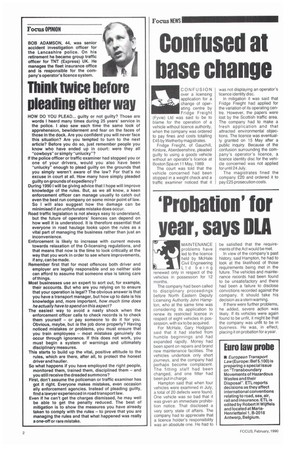Think twice before pleading either way
Page 4

If you've noticed an error in this article please click here to report it so we can fix it.
HOW DO YOU PLEAD... guilty or not guilty? Those are words I heard many times during 25 years service in the police. I also saw each time the same look of apprehension, bewilderment and -fear on the faces of those in the dock. Are you confident you will never face this situation? Are you tempted to turn to the next article? Before you do so, just remember people you know who have ended up in court: were they all "cowboys" or simply -unlucky"?
If the police officer or traffic examiner had stopped you or one of your drivers, would you also have been "unlucky" enough to plead guilty on the grounds that you simply weren't aware of the law? For that's no excuse in court at all. How many have simply pleaded guilty on grounds of expediency?
During 1990 I will be giving advice that I hope will improve knowledge of the rules. But, as we all know, a keen enforcement officer can manage usually to catch out even the best run company on some minor point of law. So I will also suggest how the damage can be minimised if an unfortunate mistake does occur.
Road traffic legislation is not always easy to understand, but the future of operators' licences can depend on how well it is understood. It is therefore essential that everyone in road haulage looks upon the rules as a vital part of managing the business rather than just an inconvenience.
Enforcement is likely to increase with current moves towards relaxation of the 0-licensing regulations, and that means that now is the time to look critically at the way that you work in order to see where improvements, if any, can be made.
Remember first that for most offences both driver and employer are legally responsible and so neither side can afford to assume that someone else is taking care of things.
Most businesses use an expert to sort out, for example, their accounts. But who are you relying on to ensure that your operation is legal? The obvious answer is that you have a transport manager, but how up to date is his knowledge and, more important, how much time does he actually have to spend on this aspect?
The easiest way to avoid a nasty shock when the enforcement officer calls to check records is to check them yourself or pay someone to do it tor you. Obvious, maybe, but is the job done properly? Having noticed mistakes or problems, you must ensure that you train employees most mistakes genuinely do occur through ignorance. If this does not work, you must begin a system of warnings and ultimately disciplinary measures.
This starts to build up the vital, positive attitude to the rules, which are there, after all, to protect the honest driver and haulier.
So what happens if you have employed the right people, monitored them, trained them, disciplined them and you still receive the dreaded summons?
First, don't assume the policeman or traffic examiner has got it right. Everyone makes mistakes, even occasion ally enforcement agencies. Instead of pleading guilty, find a lawyer experienced in road transport law.
Even if he can't get the charges dismissed, he may well be able to get the penalty reduced. The best of mitigation is to show the measures you have already taken to comply with the rules to prove that you are managing the rules and that what happened was really a one-off or rare mistake.




















































































































